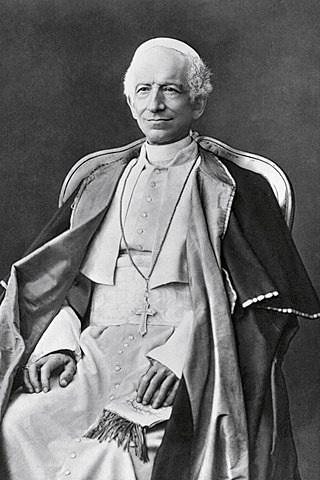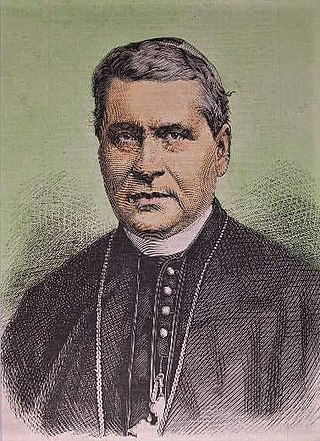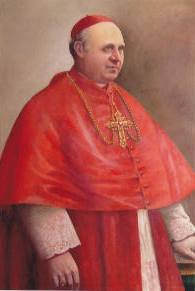Related Research Articles

In the teaching of the Catholic Church, an indulgence is "a way to reduce the amount of punishment one has to undergo for (forgiven) sins". The Catechism of the Catholic Church describes an indulgence as "a remission before God of the temporal punishment due to sins whose guilt has already been forgiven, which the faithful Christian who is duly disposed gains under certain prescribed conditions…"

The Litany of the Blessed Virgin Mary is a Marian litany originally approved in 1587 by Pope Sixtus V. It is also known as the Litany of Loreto, after its first-known place of origin, the Shrine of Our Lady of Loreto (Italy), where its usage was recorded as early as 1558.

The Apostolic Penitentiary, formerly called the Supreme Tribunal of the Apostolic Penitentiary, is a dicastery of the Roman Curia and is one of the three ordinary tribunals of the Apostolic See. The Apostolic Penitentiary is chiefly a tribunal of mercy, responsible for issues relating to the forgiveness of sins in the Catholic Church.

The papal conclave held from 31 July to 4 August 1903 saw the election of Cardinal Giuseppe Melchiorre Sarto to become pope in succession to Leo XIII, who had died on 20 July after a 25-year-long pontificate. Some 62 cardinals participated in the balloting. Emperor Franz Joseph of Austria asserted the right claimed by certain Catholic rulers to veto a candidate for the papacy, blocking the election of the leading candidate, Cardinal Secretary of State Mariano Rampolla. Sarto was elected on the seventh ballot and took the name Pius X.

The papal conclave held from 18 to 20 February 1878 saw the election of Vincenzo Pecci, who took the name Leo XIII as pope. Held after the death of Pius IX, who had had the longest pontificate since Saint Peter, it was the first election of a pope who would not rule the Papal States. It was the first to meet in the Apostolic Palace in the Vatican because the venue used earlier in the 19th century, the Quirinal Palace, was now the palace of the king of Italy, Umberto I.

The Dicastery for the Clergy, formerly named Congregation for the Clergy, is the dicastery of the Roman Curia responsible for overseeing matters regarding priests and deacons not belonging to religious orders. The Congregation for the Clergy handles requests for dispensation from active priestly ministry, as well as the legislation governing presbyteral councils and other organisations of priests around the world. The Congregation does not deal with clerical sexual abuse cases, as those are handled exclusively by the Dicastery for the Doctrine of the Faith.

The Dicastery for Divine Worship and the Discipline of the Sacraments is the dicastery of the Roman Curia that handles most affairs relating to liturgical practices of the Latin Church as distinct from the Eastern Catholic Churches and also some technical matters relating to the sacraments.

The Dicastery for the Eastern Churches, previously named Congregation for the Oriental Churches or Congregation for the Eastern Churches, is a dicastery of the Roman Curia responsible for contact with the Eastern Catholic churches for the sake of assisting their development and protecting their rights. It also maintains whole and entire in the one Catholic Church the heritage and canon law of the various Eastern Catholic traditions. It has exclusive authority over the following regions: Egypt and the Sinai Peninsula, Eritrea and northern Ethiopia, southern Albania and Bulgaria, Cyprus, Greece, Iran, Iraq, Lebanon, Israel, Syria, Jordan and Turkey, and also oversees jurisdictions based in Romania, Southern Italy, Hungary, India and Ukraine.

Luigi Tripepi was an Italian Roman Catholic cardinal and poet. He was one of the most important Roman Catholic apologists of the 19th century.
The Sacred Congregation of Rites was a congregation of the Roman Curia, erected on 22 January 1588 by Pope Sixtus V by Immensa Aeterni Dei; it was divided into two separate congregations by Pope Paul VI on 8 May 1969.

Basilio Pompili was an Italian Catholic prelate who served as Vicar General of Rome from 1913 until his death. He was elevated to the cardinalate in 1911.

Luigi Maria Bilio, was a Cardinal of the Roman Catholic Church who, among other offices, was Secretary of the Supreme Sacred Congregation of the Holy Office.

Raffaele Monaco La Valletta S.T.D. J.U.D. was a Cardinal of the Roman Catholic Church who served as Secretary of the Supreme Sacred Congregation of the Holy Office.

Giovanni Simeoni was an Italian prelate of the Catholic Church who was appointed a cardinal in 1875 and served as Prefect of the Sacred Congregation for Propagation of the Faith from 1878 until his death in 1892.

Serafino Cretoni was an Italian Cardinal of the Roman Catholic Church who served as Prefect of the Sacred Congregation of Rites from 1903 until his death, and was elevated to the cardinalate in 1896.

The Raccolta, is a book, published in many editions from 1807 to 1952, that collected the texts of Roman Catholic prayers and briefly described other acts of piety, such as visiting and praying in particular churches, for which specific indulgences were granted by popes. In 1968, it was replaced by a considerably altered edition, the Enchiridion Indulgentiarum, listing fewer specific prayers but including new general grants that apply to a wide range of prayerful actions. The earliest editions were published in Italian, with the prayers themselves given in Latin, Italian, or both languages. Beginning with the 1929 edition, the Raccolta was published in Latin, with the prayers themselves given in Latin, Italian, or to a lesser degree, French, Spanish, English, and German.

The 1983 Code of Canon Law, also called the Johanno-Pauline Code, is the "fundamental body of ecclesiastical laws for the Latin Church". It is the second and current comprehensive codification of canonical legislation for the Latin Church of the Catholic Church. The 1983 Code of Canon Law was promulgated on 25 January 1983 by John Paul II and took legal effect on the First Sunday of Advent 1983. It replaced the 1917 Code of Canon Law which had been promulgated by Benedict XV on 27 May 1917.
The Eastern Catholic canon law is the law of the 23 Catholic sui juris (autonomous) particular churches of the Eastern Catholic tradition. Eastern Catholic canon law includes both the common tradition among all Eastern Catholic Churches, now chiefly contained in the Code of Canons of the Eastern Churches, as well as the particular law proper to each individual sui juris particular Eastern Catholic Church. Oriental canon law is distinguished from Latin canon law, which developed along a separate line in the remnants of the Western Roman Empire, and is now chiefly codified in the 1983 Code of Canon Law.
The following outline is provided as an overview of and topical guide to the canon law of the Catholic Church:
Traditionis custodes is an apostolic letter issued motu proprio by Pope Francis, promulgated on 16 July 2021 regarding the continued use of pre-Vatican II rites. It restricts the celebration of the Tridentine Mass of the Roman Rite, sometimes colloquially called the "Latin Mass" or the "Traditional Latin Mass". The apostolic letter was accompanied by an ecclesiastical letter to the Catholic bishops of the world.
References
- ↑ Barbier de Montault, Xavier, ed. (1868). Collection des décrets authentiques des sacrées congrégations romaines: Sacrée Congrégation des Indulgences (in French). Paris: Étienne Repos. p. V.
- ↑ Catholic Answers website, Encyclopedia, Council of Trent, by J. P. Kirsch
- ↑ Catholic Answers website, Encyclopedia, Indulgences, by W. H. Kent
- ↑ Vatican website, Benedictus XV Motu Proprio, De Attribuenda Sancto Officio Censura Librorum et Poenitentiariae Apostolicae Concessione Indulgentiarum
- Further reading
- Bountry, Philippe (2002). Souverain et Pontife. Recherches prosopographiques sur la Curie Romaine à l'âge de la Restauration (1814-1846) (in French). Publications de l'École française de Rome. pp. 100–106.